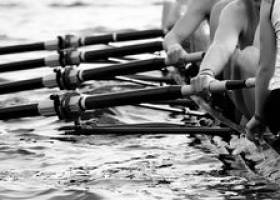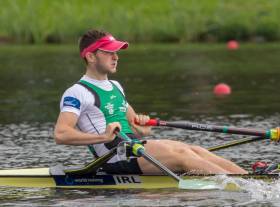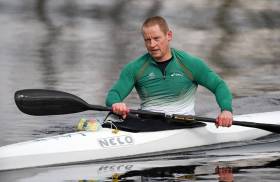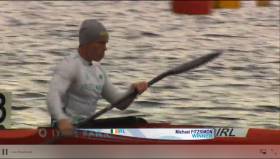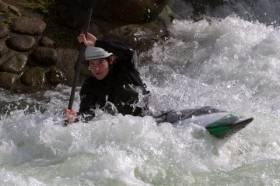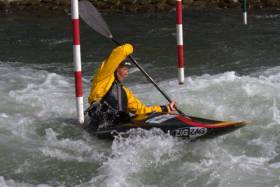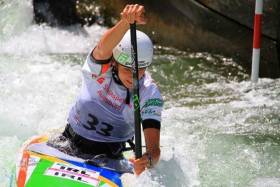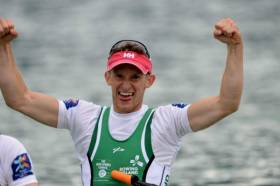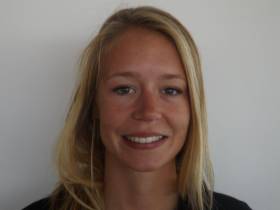Displaying items by tag: Olympic games
Ireland Crews Wait As Weather Forces Rowing Cancellation
#Rowing: The Olympic rowing programme for today, Sunday, has been postponed. The strong crosswinds disrupted a number of races on Saturday and left the Serbian men's pair in the water after a capsize. Ireland single sculler Sanita Puspure had complained about the conditions, saying the boats would not be put out to train in such difficult waters. Two Ireland boats, the women’s lightweight double of Sinead Lynch and Claire Lambe and the men’s lightweight double of Paul and Gary O’Donovan were due to compete in their first race today, but must now wait.
Fisa Bans All But Six Russian Rowers From Olympics
#Rowing: Only six Russia competitors have been cleared by Fisa, the governing body of rowing, to compete at the Olympic Games. Twenty were ruled ineligible as records were scrutinised in line with the International Olympic Committee’s guidelines on drug testing. One Irish crew, the lightweight women’s double, is affected. The Russia crew of Alena Statagina and Anastasiia Ianina will not be allowed participate, and their place will be offered to Italy.
The full Fisa statement reads:
The FISA Executive Committee has made a final decision related to Russian participation for rowing in Rio 2016 in accordance with the IOC Executive Board’s decision, point 2.3.
IOC Decision, point 2.3 – “IFs should carry out an individual analysis of each athlete’s anti-doping record, taking into account only reliable adequate international tests and the specificities of the athlete’s sport and its rules, in order to ensure a level playing field”
Russia has qualified five boats and entered 26 rowers and two coxswains for the Olympic Games in Rio de Janeiro. The athletes’ names were entered by the Russian Olympic Committee (ROC) by the deadline of 18 July 2016. Testing information collected from FISA, WADA, the Russian Rowing Federation (RRF), RUSADA and UK Anti-Doping shows that a total of 1679 blood and/or urine tests were carried out between 2011 and June 2016 on all Russian rowers. For the Russian rowers entered for Rio, 547 blood and urine tests were conducted since 2011. None of the 28 athletes entered on 18 July have tested positive in the last five years.All of these tests are fully documented in the WADA online documentation tool called ADAMS.
However, WADA’s Independent Person (IP) report reveals that the Moscow Laboratory was under the control of the Deputy Minister of Sport and was using the Disappearing Positive Methodology scheme to manipulate test results. It also states that the IP has “only skimmed the surface of the extensive data available.” Therefore, the FISA Executive Committee reviewed each entered Russian rower in order to assess the adequacy and reliability of their “international” testing (the analysis of the samples performed at a WADA accredited lab other than Moscow), taking into account the specificities of the sport of Rowing.
IOC Decision, point 4. “The IOC will accept an entry by the ROC only if the athlete’s IF is satisfied that the evidence provided meets conditions 2 and 3 above, and if it is upheld by an expert from the CAS list of arbitrators appointed by an ICAS Member”
The FISA Executive Committee, due to the manipulation of the Moscow Laboratory tests, has determined, based on the assessment of independent testing of all rowers, the following will be permitted to enter:
CHAUKIN, Aleksandr
EFREMENKO, Georgy
KOSOV, Artem
MORGACHEV, Nikita
RYABCEV, Vladislav
ZARUTSKIY, Anton
The remaining 17 entered rowers and two coxswains (besides the three rowers revealed yesterday) are not at all considered to have participated in doping, but do not meet the conditions established by the IOC in their decision of 24 July 2016 for participation in the Rio 2016 Olympic Games.
Effect of this decision
The effect of this decision is that Russia has six remaining eligible rowers - one lightweight and five open weight men - for competition in Rio 2016.
Therefore, four Russian boats (LM4-, LW2x, M8+ and W8+) will be withdrawn from participation in the Games and will be attributed to the next placing crews at the 2016 Final Olympic Qualification Regatta in Lucerne, Switzerland, as follows:
LM4- to Greece, the Hellenic Rowing Federation
M8+ to the Italian Rowing Federation
W8+ to the Australian Rowing Federation
And in the 2016 European Continental Qualification Regatta in Lucerne, Switzerland:
LW2x to the Italian Rowing Federation
Russia has the possibility to form a men’s four (M4-) with the eligible six rowers for competition in Rio 2016. We await the Russian Rowing Federation’s decision on this possibility.
Any issues with the Russian participation at the Paralympic Games will be dealt with at a later date.
Single and Double Success Brings O'Donovan Afloat Honour
#Rowing: Paul O’Donovan is set to have an extraordinary August, competing at the Olympic Games in Rio de Janeiro and the World Rowing Championships in Rotterdam. He is named the Afloat Rower of the Month for his achievements in June. Paul and his brother, Gary, continued their impressive run in the lightweight double sculls. They took fourth in the World Cup regatta in Poznan, Poland. They placed ahead of Britain, who were silver medallists at the World Championships in 2015, in both the repechage and the final. Germany, who were sixth last year, could not qualify from the repechage, which was won by Ireland in the fastest time they have done in a race. They head off to a block of training in Spain having moved from 11th in the world last year to a ranking of 5th in the bookies’ odds for Rio.
Paul O’Donovan has been chosen to compete in the lightweight single in Rotterdam. In a shoot-out with Gary at Cork Regatta in the senior single he proved his credentials with a big win. Despite being a lightweight, he is the best single sculler in Ireland.
Rower of the Month awards: The judging panel is made up of Liam Gorman, rowing correspondent of The Irish Times, and David O'Brien, editor of Afloat magazine. Monthly awards for achievements during the year will appear on afloat.ie and the overall national award will be presented to the person or crew who, in the judges' opinion, achieved the most notable results in, or made the most significant contribution to rowing during 2016. Keep a monthly eye on progress and watch our 2016 champions list grow.
#Canoeing: Patrick O’Leary won his B Final at Paracanoe World Championships in Duisburg this morning, placing 10th overall in KL3 200 and qualifying for the Paralympic Games. The Irishman, who was very close to taking an A Final place, beat Arsen Arsenovic of Serbia and Dylan Littlehales of Australia, who dead heated for second.
Canoe Sprint European Olympic Qualifier, Duisburg, Germany (Selected Results, Irish interest)
Men
K1 1,000 – Final: 1 Hungary (B Dombvári) 3 min 35.307, 2 Russia (R Anoshkin) 3:35.695; 4 M Fitzsimon 3:38.727.
Women
K1 500 – Final: 1 Germany (S Hering) 1 min 55.378, 2 Slovakia (M Kohlová) 1:55.677; 8 J Egan 2:00.270.
Paracanoe World Championships, Duisburg
Men - KL3 200 – B Final (Places 10-18): 1 P O’Leary 42.882 seconds.
Fitzsimon Wins Semi-Final at Olympic Qualifier
#Canoeing: Michael Fitzsimon won his semi-final of the men’s K1 1,000 metres to reach the A Final at the canoe sprint European Olympic Qualifier in Duisburg in Germany. The under-23 competitor can qualify for the Olympic Games if he finishes in the top two in the final.
Canoe Sprint European Olympic Qualifier, Duisburg, Germany (Selected Results, Irish interest)
Men
K1 1,000 – Heat One (Winner to A Final; 2-7 to semi-final; rest out): 4 M Fitzsimon 3:31.693. Semi-Final: 1 Fitzsimon 3:31.453.
K2 200 – Heat One (First Three to A Final; 4-7 to semi-final): 6 T Brennan, B Watkins 34.350. Semi-Final (First Three to A Final; rest out): 5 Brennan, Watkins 34.249.
Women
K1 500 – Heat One (Three to Final; 4-7 to Semi-Final): 5 J Egan 1:55.428. Semi-Final (Three to A Final): 3 Egan 1:52.823.
Paracanoe World Championships, Duisburg
Men - KL3 200- Heat Four (First Seven to Semi-Final): 2 P O’Leary 42.061. Semi-Final One (First Two and next best time to A Final; 3rd, 4th to B Final): 3 O’Leary 41.722.
Jegou Gives Best But Misses Olympic Qualification
#Canoeing: Ireland’s Liam Jegou finished 19th in the semi-finals of the canoe slalom European Championships this morning. Jegou came down the course at Liptovsky Mikulas in Slovakia in 105.02 seconds. He had touches on gates one, nine and 20, thus incurring six seconds on penalties. His time of 111.02 put him fourth at that point – crucially .2 of a second behind Italy’s Raffaello Ivaldi, so ruling out the Irishman taking the top place amongst those countries who had not qualified for the Olympics.
Ander Elosegi of Spain qualified that country for the Olympic Games. He finished sixth in 104.18 – the first boat from a country not already qualified. Elosegi qualified for the final and should Jegou have also qualified, the two would have had to shoot it out on Sunday.
Canoe Slalom European Championships, Liptovsky (Irish interest, selected results) – Day Two
Men
C1 – Semi-Finals: 1 Germany (S Tasiadis) 99.79; 19 Ireland (L Jegou) 111.02 seconds (incl 6 sec pen)
No Joy for Craig at European Championships
#Canoeing: Hannah Craig’s chances of Olympic qualification disappeared as the K1 competitor failed to make the semi-finals of the canoe slalom European Championships in Slovakia. The Antrim woman, who had finished 10th in London in 2012, negotiated the course in 111.59 seconds, including four seconds of penalties, in the first run. This placed her 28th. Her second run gave her another chance, but she missed the final two gates, incurring 100 seconds in penalties, and missed out.
Liam Jegou Qualifies for European Semi-Finals
#Canoeing: Liam Jegou qualified for the semi-finals of the canoe slalom European Championships in Liptovsky Mikulas in Slovakia this morning. A second run of 98.33 seconds with no touches put the 20-year-old through in the C1 category. His first run of 105.36, with a two-second penalty on gate six, had placed him 29th and eight places outside qualification, but his second run was much better. If Jegou can do well enough in the succeeding rounds so that his boat is the first from a country not already qualified for the Olympic Games, he will secure a place in Rio de Janeiro.
Gary O'Donovan is Afloat Rower of the Month
#Rower of the Month: Gary O’Donovan is the Afloat Rower of the Month for March. The Skibbereen man had to compete in the lightweight single scull at the Ireland trials after his brother and crewmate, Paul, pulled out ill. Gary set excellent times, showing how much he has improved individually, in addition to being half of the crew of the lightweight double which will compete in international events in Europe in the summer and the Olympic Games in Rio de Janeiro in August.
Rower of the Month awards: The judging panel is made up of Liam Gorman, rowing correspondent of The Irish Times, and David O'Brien, editor of Afloat magazine. Monthly awards for achievements during the year will appear on afloat.ie and the overall national award will be presented to the person or crew who, in the judges' opinion, achieved the most notable results in, or made the most significant contribution to rowing during 2016. Keep a monthly eye on progress and watch our 2016 champions list grow.
Ireland Send Seven Crews to First World Cup Regatta
#Rowing: The Ireland team for the first World Cup regatta, in Varese in Italy from April 15th to 17th, will feature seven crews. The Olympic-bound lightweight double sculls of Sinéad Jennings and Claire Lambe and Paul O’Donovan and Gary O’Donovan will be joined by the three boats which hope to find their way to Rio through the qualifiers in May – the lightweight men’s four, the women’s pair and single sculler Sanita Puspure – and by Siobhán McCrohan and Denise Walsh in lightweight single sculls. McCrohan and Walsh were to trial for a single spot, but the trial was twice postponed and both will now travel.
Pararower Karol Doherty will go out with the bulk of the team on April 12th, and will compete in the Paralympic Qualifier in Gavirate in Italy on April 20th to 23rd.
Ireland Team for World Cup, Varese, Italy, April 15th to 17th
Men
Lightweight Four: L Seaman, M O’Donovan, L Keane, S O’Driscoll. Lightweight Double Scull: P O’Donovan, G O’Donovan.
Women
Pair: L Kennedy, B O’Brien. Lightweight Double Scull: C Lambe, S Jennings. Single Scull: S Puspure. Lightweight Single Scull: S McCrohan, D Walsh.
Crew for Paralympic Qualification Regatta, Gavirate, Italy, April 20th-23rd: K Doherty (Arms and Shoulders men’s single scull).


























